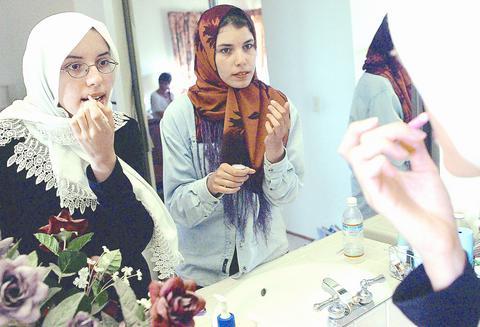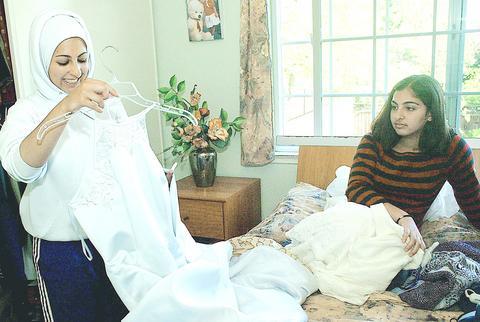The trappings of a typical high school prom were all there: the strobe lights, the garlands, the crepe pineapple centerpieces and even a tiara for the prom queen. In fact, Fatima Haque's prom had practically everything one might expect on one of the most important nights of a teenage girl's year. Except boys.
Fatima and her friends may have invented a new American ritual: the all-girl Muslim prom. It is a spirited response to Muslim religious and cultural beliefs in which dating, dancing with or touching boys or appearing without wearing a hijab, the Islamic head-covering, is not permitted. While Fatima and her Muslim friends do most of the things other teenagers do -- shoe-shopping at Macy's, watching The Matrix Reloaded at the mall or ordering Jumbo Jet burgers and curly fries at Jack in the Box -- the main ingredient of the American prom, boys, is off limits.
So they decided to do something about it.

PHOTO: NY TIMES
"A lot of Muslim girls don't go to the prom," said Fatima, 18, whose parents come from Pakistan and who removed her hijab and shawl at the prom to reveal an ethereal, silvery gown. "So while the other girls are getting ready for their prom, the Muslim girls are getting ready for our prom, so we won't feel left out."
The room was filled with the sound of the rapper 50 Cent, Arabic pop music, Britney Spears and about two dozen girls, including some non-Muslim friends. But when the sun went down, the music stopped temporarily, the silken gowns disappeared beneath full-length robes, and all the Muslims in the room faced toward Mecca to pray. Then it was time for spaghetti and lasagna.
It is perhaps a new version of having it all: embracing the American prom culture of high heels, mascara and adrenaline while being true to their identity as Muslims.

PHOTO: NY TIMES
"These young women are being very creative, finding a way to continue being Muslim in the American context," said Jane I. Smith, a professor of Islamic studies at the Hartford Seminary in Connecticut. "Before, young Muslims may have stuck with the traditions of their parents or rejected them totally to become completely Americanized. Now, they're blending them."
Non-Muslim students at San Jose High Academy, where Fatima is student body president, went to the "regular" prom last month -- renting cars and limousines, dining at the Sheraton, going to breakfast at Dennys and, for some, drinking.
Fatima, meanwhile, was on her turquoise cell phone with the smiley faces organizing the prom. She posted an announcement on Bay Area Muslim Youth, a Yahoo site avidly scanned by young people throughout the sprawling Bay area, home to one of the country's largest and most active Muslim communities.
"We got so close we wanted to hang," her friend Fatin Alhadi, 17, said, explaining the farewell-to-high-school celebration, which involved cooking, shopping and hanging decorations at a suburban community center rented with a loan from Fatima's parents. "It's an excuse to dress and put makeup on. Everyone has so much fun at the prom."
The sense of anticipation was palpable at Fatima's house this afternoon, including the occasional "Relax, mom!" For Fatima and her friends, Muslim prom -- like any prom -- means getting your eyebrows shaped at the last minute at Beauty Plus Salon, ransacking your mothers' jewelry box. It is a time to forget about the clock, to look in the mirror and see a glamorous woman instead of a teenager. To be radiant.
Fatima and her Muslim girlfriends dwell in a world of exquisite subtlety in which modesty is the operative word. Fatin recently dyed her black hair auburn. "Everyone asks me why, because nobody sees it," she said. "But I like to look at myself."
Fatima, who will attend the University of California at Berkeley in the fall, is one of a growing number of young Muslim women who have elected to adopt the covering their mothers rejected. Islamic dress, worn after puberty, often accompanies a commitment not to date or engage in activities where genders intermingle. Her mother, Shazia, who has a master's degree in economics, does not wear the hijab.
Fatima's decision to cover herself, which she did freshman year, was nuanced and thoughtful.
"I noticed a big difference in the way guys talked," she recalled. "They were afraid. I guess they had more respect. You walked down the street and you didn't feel guys staring at you. You felt a lot more confident." Her parents were shocked but said it was her decision.
Fatima has faced some post 9/11 taunts. "They call you terrorist, or raghead because high school students are immature," she explained. But she and her friends say Muslim boys, unidentified by dress, may have a tougher time.
"The scarf draws the line," said Fatin, the daughter of a Singaporean mother and Indonesian father who often finishes her friend Fatima's sentences. "It's already a shield. Without it everything comes to you and you have to fight it yourself."
Fatima and her friends attend the academically elite International Baccalaureate Program at a public high school, where, as their friend Morgan Parker, 17, put it, "the jocks are the nerds." But the social pressures, especially in less cloistered settings, can be intense.
"I felt left out, big-time," said Saira Lara, 17, a senior at Gunn High School in Palo Alto of her school prom, looking dazzling in a flowing maroon gown. But she gets a vicarious taste of dating by talking with her non-Muslim friends.
"The drama that goes on! The Valentines Day without a phone call or a box of chocolates!"
Imran Khan, 17, a senior at Los Altos High School, admits that his school's prom was not easy.
"When I told my friends I wasn't going they all said "are you crazy?"' he said in a phone interview. "Prom is a you-have-to-go kind of thing. Obviously if all your friends are going you're not you're going to feel something. That day I was, `Oh man, my friends are having fun and I'm not.' But I don't regret not going."
Most of Imran's school friends are not Muslim, and his Muslim friends are scattered across the Bay area.
"A lot of times it's difficult," he said. "We guys blend in so you can't tell we're Muslim. We're not supposed to touch the opposite gender. My friends who are girls understand, but when other girls want to hug you or shake your hand, it's hard. I don't want them to think I'm a jerk or something."
Adeel Iqbal, 18, a senior at Bellarmine College Preparatory, an all-male Catholic school in San Jose, went to his co-ed senior prom stag. Adeel decided to go both in his official capacity as student body president and as a representative of his Muslim beliefs.
"Every day we're bombarded with images of sex and partying and getting drunk, in music and on TV, so of course there's a curiosity," he said. "When you see your own peers engaging in these activities, it's kind of weird. It takes a lot of strength to not participate. But that's how I've been raised. When your peers see you're different in a positive way, they respect it."

May 11 to May 18 The original Taichung Railway Station was long thought to have been completely razed. Opening on May 15, 1905, the one-story wooden structure soon outgrew its purpose and was replaced in 1917 by a grandiose, Western-style station. During construction on the third-generation station in 2017, workers discovered the service pit for the original station’s locomotive depot. A year later, a small wooden building on site was determined by historians to be the first stationmaster’s office, built around 1908. With these findings, the Taichung Railway Station Cultural Park now boasts that it has

The latest Formosa poll released at the end of last month shows confidence in President William Lai (賴清德) plunged 8.1 percent, while satisfaction with the Lai administration fared worse with a drop of 8.5 percent. Those lacking confidence in Lai jumped by 6 percent and dissatisfaction in his administration spiked up 6.7 percent. Confidence in Lai is still strong at 48.6 percent, compared to 43 percent lacking confidence — but this is his worst result overall since he took office. For the first time, dissatisfaction with his administration surpassed satisfaction, 47.3 to 47.1 percent. Though statistically a tie, for most

Wooden houses wedged between concrete, crumbling brick facades with roofs gaping to the sky, and tiled art deco buildings down narrow alleyways: Taichung Central District’s (中區) aging architecture reveals both the allure and reality of the old downtown. From Indigenous settlement to capital under Qing Dynasty rule through to Japanese colonization, Taichung’s Central District holds a long and layered history. The bygone beauty of its streets once earned it the nickname “Little Kyoto.” Since the late eighties, however, the shifting of economic and government centers westward signaled a gradual decline in the area’s evolving fortunes. With the regeneration of the once

In February of this year the Taipei Times reported on the visit of Lienchiang County Commissioner Wang Chung-ming (王忠銘) of the Chinese Nationalist Party (KMT) and a delegation to a lantern festival in Fuzhou’s Mawei District in Fujian Province. “Today, Mawei and Matsu jointly marked the lantern festival,” Wang was quoted as saying, adding that both sides “being of one people,” is a cause for joy. Wang was passing around a common claim of officials of the People’s Republic of China (PRC) and the PRC’s allies and supporters in Taiwan — KMT and the Taiwan People’s Party — and elsewhere: Taiwan and